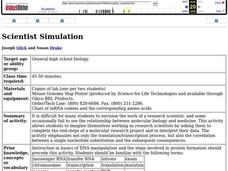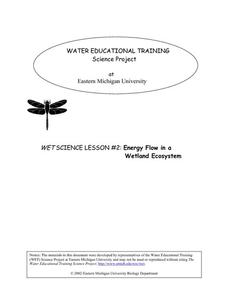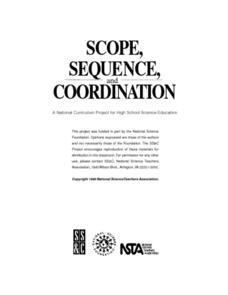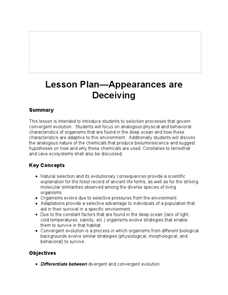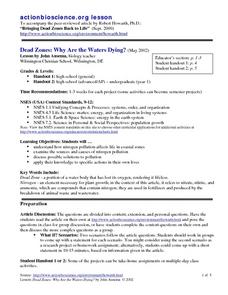Curated OER
Scientist Simulation
Students envision the work of a research scientist, and the relationship between molecular biology and medicine. This activity allows students to imagine themselves working as research scientists by asking them to complete the end-steps...
Curated OER
Marine Protected Areas
Students design a research project about a Marine Protected Area they chose. In this marine biology instructional activity, students gather fish count and catch data then graph them. They create an information poster about their findings.
University of Minnesota
C. elegans and the Search for Extraterrestrial Life
Introduce the topic of astrobiology in a unit that's out of this world. Biology scholars examine the search for extraterrestrial life by culturing roundworms, a species that has been key in helping researchers understand the challenges...
Howard Hughes Medical Institute
Understanding Variation
Does where we live influence how our bodies express genetic traits? Explore variation in human skin color with an activity that incorporate video and hands-on learning. Individuals model the relationship between phenotypes and genotypes,...
Curated OER
Photosynthesis
Seventh graders investigate a multidisciplinary unit with an emphasis in using technology in order to engage them. The students perform Internet research about photosynthesis with a written assessment taken from the WebQuest.
Curated OER
The Intertidal Zone
Young scholars research the diverse animal and plant life that inhabit the intertidal zones along the Pacific rocky coast. As students progress through this lesson, they begin to recognize distinct behaviors, adaptations, and...
Nuffield Foundation
Going up in Smoke
Don't let all your hard work go up in smoke. Pupils conduct an experiment to see the harmful effects of cigarette smoke. They observe how smoke changes the color of white wool and an indicator solution.
Curated OER
Biome EcoWatch Project
Students work together to complete the Biome EcoWatch project. Using the Internet, they research the relationship between abiotic factors and living organisms within a biome. They create a multimedia presentation to share their...
Curated OER
Around-The-World-Zoo
Junior biologists design and maintain a website about a zoo by researching, classifying, and providing the correct habitats for the animals they choose to have in their zoo. This technology-based project can last over an entire semester...
Curated OER
Genetic Technology
In this genetic technology instructional activity, students will answer 6 true or false statements and 4 short answer questions based on the mapping and sequencing of the human genome and the applications of the Human Genome Project.
Curated OER
Investigative Case - "Swampeast Missouri"
Students explore wetland hydrology and biology and decide whether or not to restore a wetland or retain dams and drainage systems. They examine the complexity of decisions regarding wetland restoration as well as investigate viewpoints...
Eastern Michigan University
Energy Flow in a Wetland Ecosystem
How is energy transferred within an ecosystem? What would happen to a food web if one of the organisms was removed? Elementary or middle school ecologists examine these questions and more in a comprehensive 5E learning cycle lesson....
Curated OER
Variations in Living Things
Biology beginners observe traits in a collection of plant parts to realize the tremendous amount of genetic variation within a species. They consider rules of nature and discuss what would happen if they changed. They also examine data...
Curated OER
Adaptations to Niches and Habitats
Life science learners measure and record traits of seeds, leaves, and their own hands and then graph the data to find a continous distribution curve. They compare and color diagrams of seven different animals' forelimbs (not included),...
Curated OER
Cells: A First-Hand View
In the first of two activities, your charges prepare wet mount slides of cork and bean sprout cells in imitation of Robert Hooke's historical investigation. An excerpt from his notes is included. Then, investigators compare animal cells...
Curated OER
Catalysts and Enzymes
Biochemists experiment with the oxothermic decomposition of hydrogen dioxide by adding manganese dioxide. They observe how pepsin enhances the action of acid on the digestion of egg white proteins. They use yeast to make bread rise. All...
Curated OER
Prokaryotes and Eukaryotes
Examine cyanobacteria cells as an example of prokaryotes and several other alga as examples of eukaryotes. Future biologists compare the two and notice the absence of nuclei in prokaryotes. These are classic activities for this purpose,...
Curated OER
Design a Reef!
Using a miniature coral reef aquarium kit, young ecologists model this unique ecosystem. They research various coral reef organisms and their niches, and they culminate the project by working together to write a report. Use this activity...
Curated OER
Genetic Disorders
Students examine how living cells reproduce and how traits are passed on. In this genetic reproduction lesson students research a topic and present it to the class.
Curated OER
Placing Artificial Domiciles to Attract Bumble Bees
Young scholars investigate how to entice bumble bees to accept artificial domiciles. They conduct research about bee biology and nest architecture, plan and construct an artificial domicile to attract bumble bee queens, and monitor and...
Curated OER
Lesson Plan - Appearances are Deceiving
Herre is a lesson on divergent and convergent evolution. It has links to terrific video clips, an associate worksheet, and more. The analysis questions have been reviewed separately on Lesson Planet if you would like more information....
Curated OER
Dead Zones: Why Are the Waters Dying?
Students investigate the effects of pollution on marine ecosystems. They read and discuss an article, identify the effects of pollution on marine life, conduct research on local nutrient pollution, and conduct local water quality studies.
Curated OER
That's Predictable - Stream Side Science
Research the impact that changes in biotic or abiotic factors might have on an ecosystem. Debate for or against the changes and take action in the community. This resource ideally follows stream studies that young ecologists may have...
PBS
Lesson Plan: “Seeing the Way: A Brief History of Cataract Surgery”
After looking at the history of cataract surgery techniques, your high schoolers will have a new perspective on medical and scientific advances. Kids alternate between watching short video clips, class discussion, and computer research....


